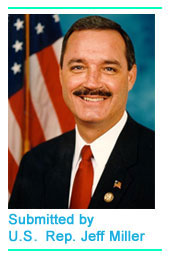Jeff Miller: Voting Against Fiscal Cliff Deal
January 7, 2013
Late on New Year’s Eve, a deal was struck behind closed doors in the Senate to avert the “fiscal cliff”—the return to Clinton-era tax rates and the implementation of deep cuts to defense and other discretionary spending imposed under Sequestration. The Senate, without having sufficient time to read the full bill, quickly voted to pass this deal and left town. The House met on New Year’s Day to take up the bill as passed by the Senate and 257 members voted in favor of passage. I voted against it.
 Our nation currently sits at the bottom of a fiscal well, drowning in more than $16.4 trillion in debt—debt that has grown by more than $1 trillion in each of the four years since President Obama was first elected, and that is projected to continue its runaway growth into perpetuity. Rather than embracing a solution that addresses the roots of our current fiscal crisis—debt and spending—this deal raises taxes on job creators, makes no significant reforms to entitlements or cuts to discretionary spending, and increases our debt by an additional $4 trillion over the next 10 years. Furthermore, it doesn’t reasonably address Sequestration’s cuts to our national defense, but again kicks the can down the road.
Our nation currently sits at the bottom of a fiscal well, drowning in more than $16.4 trillion in debt—debt that has grown by more than $1 trillion in each of the four years since President Obama was first elected, and that is projected to continue its runaway growth into perpetuity. Rather than embracing a solution that addresses the roots of our current fiscal crisis—debt and spending—this deal raises taxes on job creators, makes no significant reforms to entitlements or cuts to discretionary spending, and increases our debt by an additional $4 trillion over the next 10 years. Furthermore, it doesn’t reasonably address Sequestration’s cuts to our national defense, but again kicks the can down the road.
Rather than cutting spending, the bill I voted against adds $134 billion in stimulus spending, extends for the 11th time the “temporary” unemployment benefits extension, re-establishes the death tax at a 40 percent rate, and continues the marriage penalty. And despite the President’s claims to the contrary, this bill does in fact raise taxes on middle class Americans. That middle class tax increase comes from the expiration of the two percent payroll tax cut. So, every American worker, regardless of income, will see a two percent increase in their tax bill. If you make $30,000 per year, your tax bill will increase by $600 this year.
The painful, uncomfortable truth we need to confront as a community of Americans is this: we cannot tax our way out of this crisis. Washington has a problem because it spends too much, not because it doesn’t tax enough. Even if we raise taxes on top earners to 100 percent, we still will not generate enough revenue to close our budget deficit and begin paying down our mountain of debt. In fact, according to House Budget Chairman, Paul Ryan, taxing top earners at 100 percent would only run the government for two and a half to three months. The fact of the matter is that government spending on entitlements and unnecessary discretionary programs has grown to unsustainable levels. The longer we take to confront this truth, the closer our nation comes to fiscal and economic ruin.
The President and his administration are correct that we need a balanced approach to deficit reduction, but their definition of “balanced” is unrealistic. In their minds, a deal in which we cut $1 in spending for every $41 in tax increases, while adding $4 trillion to the debt, is “balanced.” That is the kind of math that put us in our current predicament, and it is a dangerous mindset for the people who are supposed to lead us on a path to prosperity.
A responsible, truly balanced approach to deficit reduction will include long-overdue entitlement reforms that restore sustainability to programs like Social Security, Medicare, and Medicaid, and ensure their viability for future generations. A balanced approach will include tax code reforms that simplify our tax code, lower rates, and provide individuals and businesses with the certainty they need to achieve success. Finally, a balanced approach will eliminate wasteful spending on unnecessary government programs to ensure we have the resources to invest in the core functions of government laid out by our Founders in the Constitution.
The elements of a balanced approach I just laid out were conspicuously absent in the deal agreed to on New Year’s Day. I was not elected to this office to enable the irresponsible behavior that got us in our current predicament, and I will not be deceived by attempts to sugarcoat wasteful legislation. This is why I voted against the fiscal cliff deal, and it is why I will continue to fight for legislation that reins in wasteful government spending.
Gladys Ruth Smith
January 7, 2013
Mrs. Gladys Ruth Smith, 70, passed away on Saturday, January 5, 2013, in Flomaton.
Mrs. Smith was a native of Jay and a resident of Flomaton for most of her life. Mrs. Smith was an avid fisherman, hunter and was an outdoors person.
Survivors include her husband, Leon Smith of Flomaton; son, James Ates of Century; stepson, Joe Smith of Flomaton; three daughters, Doreen Crooke of Bluff Springs, Joyce Rena Burton of McDavid, and Kathy Smith of Poarch; two stepdaughters, Kay Pugh of Flomaton and Angie Taylor of Flomaton; two brothers, Robert Tolbert of Flomaton and Chester Tolbert of Jay; four sisters, Sara Weaver of Byrneville, Abbie Smith of Flomaton, Rose Richardson of Flomaton, and Irene Barlow of Pensacola; 13 grandchildren and 13 great-grandchildren.
Funeral services will be Wednesday, January 9, 2013, at 10 a.m. at the Petty-Eastside Chapel Funeral Home in Atmore with the Rev. Willie Oglesby and Rev. Gordon Dillashaw.
Burial will follow at Green Acres Cemetery.
Visitation will be Tuesday, January 8, 2013, from 6-9 p.m. at the Petty-Eastside Chapel Funeral Home.
Pallbearers will be Tommy Macks, Lee Waller, Jason Macks, Chris Comalander, Casey Smith, Jay Ates and Heith Smith.
Honorary pallbearers will be Shelby Smith and Joe Smith.
Petty-Eastside Chapel Funeral Homes is in charge of all arrangements.
Dr. Fred Mason West
January 7, 2013
Dr. Fred Mason West, a longtime resident and physician of Evergreen, AL, departed from this world for his Heavenly Home on Thursday, January 3, 2013, after a lengthy illness. Dr. West, the first born of Frank Mason West and Mary Kate (Terrell) West, was born in Berrydale, FL on February 28, 1937. Fred was baptized at the age of 11 as a member of the church now known as Community of Christ.
As the eldest child, Fred was charged with the responsibility of helping his Dad farm their land at a very early age. He set a great example for his brothers and sister. He was faithful in his work ethic on the farm and still excelled in school. He graduated from Jay High School in 1955.
Fred’s calling from his earliest memory was to be a physician and healer. He was accepted into Emory at Oxford in Atlanta, GA, where he worked on his undergraduate degree prior to being accepted into medical school at Tulane University in New Orleans, LA.
While at Tulane, Fred met the love of his life, Brenda Sederholm. They were married in 1962 and shared a deep love and devotion that would last for over 38 years. Fred graduated from Tulane Medical School in 1963. He and Brenda moved to Jay, FL in 1964 where he opened his first family medical practice by tending the sick, performing surgeries and delivering babies, always with Brenda by his side.
Dr. West was a big man in stature, character and presence. He had a tremendous passion for helping the people who lived in and around the Jay Community. He believed that to whom much is given, much is expected. He tirelessly ministered to the needs of his patients while continuing his role of devoted husband, father, son and brother.
In 1976, Fred and Brenda and their sons moved to Carrollton, GA where for the next four years he enjoyed a very successful practice including being Chief of Staff. In 1980, following the death of his precious mother, Fred relocated his practice to Evergreen, AL so he could be closer to his family and hometown. While in Evergreen, he continued to provide comprehensive treatment services through his community based family medical practice for over 30 years. He enjoyed a thriving practice in Evergreen until early 2012 when ill health caused his retirement.
In 2002, his beloved wife, Brenda, passed away. Those who knew and loved Fred saw the glimmer in his eyes fade as he continued on without Brenda. It was during this time in his life when he began to focus on the spiritual as well as the physical needs of his patients and anyone and everyone he came into contact with. Dr. West was very active in the community, local jail/prison ministry and especially with his church, Evergreen Community of Christ, where his ministry as a Priest and leadership will be missed. Fred hoped to leave the world a little better for his children and grandchildren. Dr. West was a hard working man who loved his family, loved his life, and loved his Lord. We will forever love and miss our father, grandfather, brother and uncle.
He is survived by sons Fred Mason West, II, of Evergreen, and Dr. Jason R. West, along with his wife Ann Michele, and their children, Jack Mason West and Mechaley Wingate West, of Saraland, AL. He is also survived by his brothers, Ben West (Ann), Don West (Maureen) and David West (Vickie), his sister, Sandra West Blackmon, and numerous nieces and nephews.
Active pallbearers will be his nephews, Benjamin West, II, Donald West, II, David West, II and William West, and Hank Adam Locklin and Dr. Mark Roberts. The funeral service will be conducted by Ministers of the Community of Christ Elder Rogene Booker, Evangelist Gary Howard and High Priest Derrick Williams.
Funeral arrangements for Dr. West have been entrusted to Cope Funeral Home in Evergreen, AL. Visitation will be at the funeral home from 6:00 to 8:00 p.m. on Friday, January 11, 2013 and the funeral service will be conducted at 11:00 a.m. on Saturday, January 12, 2013. Immediately following the funeral service, Dr. West will be buried at the Berrydale Community of Christ Cemetery in Berrydale, FL.
Red Light Camera Repeal Filed As Report Says Crashes Down
January 7, 2013
A South Florida lawmaker filed legislation Friday to repeal the law allowing the use of red light cameras, following a report earlier this week that says intersections where they’re used have seen drops in crashes in most places.
 Rep. Daphne Campbell, D-Miami, filed legislation Friday seeking to end the use of the cameras, saying they unfairly dole out tickets to people who can’t defend themselves, noting that malfunctioning cameras can’t be cross-examined.
Rep. Daphne Campbell, D-Miami, filed legislation Friday seeking to end the use of the cameras, saying they unfairly dole out tickets to people who can’t defend themselves, noting that malfunctioning cameras can’t be cross-examined.
Meanwhile, the Department of Highway Safety and Motor Vehicles released a report Thursday showing that crashes were less frequent at red light camera intersections, based on data from 73 agencies. The report said accidents were less frequent in intersections with cameras in 41 jurisdictions but up in such intersections in 11 jurisdictions.
The rest of the 73 jurisdictions where they are in use didn’t have the data, and the state didn’t say what the overall numbers were in the report, which was sent to lawmakers.
Since state law was changed in 2010 to allow local governments to use the cameras to catch red light runners they’ve been under attack. A repeal effort was mounted starting the very next year in the Legislature.
Campbell’s legislation (HB 91) would repeal the state law that authorizes their use. The law also sets out how the money from such tickets is allocated. Before there was a state law, some local jurisdictions used them, but there was considerable confusion about whether they were legal. Even since the law has been passed, their use has continued to be challenged in court.
“The red light camera companies exploit victims to push Florida laws to gain millions,” Campbell said in a statement. “People are presumed guilty by the picture of the camera. The corporations are the ones making the money.”
The Florida League of Cities, however, said Friday that keeping the cameras is a top priority of local governments.
“Providing cities with the tools they need to keep residents safe is the Florida League of Cities’ No. 1 priority, and this technology has been proven to help authorities punish lawbreakers, reduce dangerous T-bone crashes and change the behavior of those drivers who selfishly choose to run red lights,” the league said in a statement.
Local governments don’t want to lose their share of the revenue from the $158 fines paid by people caught on red light cameras, but also say their law enforcement budgets are strained and the cameras help them enforce laws they otherwise wouldn’t be able to.
“While the data in this report suggests a significant positive effect on traffic safety, the Florida League of Cities believes the government closest to the people governs best, and nobody knows a city better than its residents,” the league’s statement said. “Some municipalities have determined that red light running is not a problem in their community and have chosen not to install traffic infraction detectors. Other cities, after holding public hearings and listening to concerned citizens, have determined that red light safety cameras will make their streets safer.”
Campbell’s bill is yet to be assigned to a committee.
By The News Service of Florida
Ada Alma Lee Dixon
January 7, 2013
Mrs. Ada Alma Lee Dixon, age 64 of Mobile, passed away on Wednesday, January 2, 2013.
Mrs. Dixon was a native of Century and had resided in Mobile for the past two and a half years coming from Brewton. She was a homemaker, a member of Gospel Light Temple in Century.
She is preceded in death by her husband, Herbert Dixon, Sr. and her parents, James Dallas and Sybil Tedder Ratliff.
Mrs. Dixon is survived by sons, Kevin (Jessie) Dixon of Brewton, Mark (Michelle) Dixon of Mobile, Eddie (Carolyn) Dixon of Bryson City, NC, Herbert (Dovee) Dixon, Jr. of Rochester, MN, David Dixon of Mobile, AL; brother, Dallas Ratliff of Flomaton; sisters, Amanda Amerson, Patty Faye Inman and Patsy Capps, all of Jay; 10 grandchildren and a number of nieces and nephews.
Visitation will be held on Tuesday, January 8, 2013, at Beulah Chapel Assembly of God Church in Century from 1 p.m. until a 2 p.m. service time with Rev. Ricky Tedder officiating.
Interment will follow in Byrneville United Methodist Cemetery in Century.
New Year Marks Return Of Perennial Issues In Florida
January 7, 2013
With the holidays over and the fiscal cliff problem put off for a few months, drivers of public policy are turning their attention toward the 2013 legislative session.
As advocacy groups prepare for a legislative cycle that for all intents and purposes begins a week from now, a handful of hot button issues has already re-emerged that will provide fodder for part-time lawmakers who will spend most of their time in the capital for the next several months.
Local pension benefits, fast-track foreclosures, taxes and health care reform are again expected to play prominently when lawmakers return for the 2013 session. With committee hearings gearing up a week from now, much of the process will happen before the official March start of the regular session.
Gov. Rick Scott was in the thick of working on his proposed budget this week. He must turn it in to lawmakers in a couple of weeks. While major growth in revenue isn’t expected, neither is a big deficit.
“Hopefully, what we’re doing is we’re solving some problems,” Scott said this week in an interview. “As we solve problems, hopefully we don’t have to spend as much money in certain areas.”
Scott said he’ll suggest more money anything that creates jobs, and look to save elsewhere. For example, more money for Enterprise Florida, which recruits companies to come to Florida – and at least a little new money for education, he said Friday. Anything that doesn’t give the state a return, might not make it.
While school funding may be safe, a number of education issues, from battles over charter schools and protecting schools from gunmen to the funding formula for early learning and how much tuition should be, will be on the table in the coming months.
HEALTH CARE
Advocates were also looking ahead this week to a health care debate in the coming year.
Medicaid and the state’s response to the Affordable Care Act have already drawn the attention of both Scott and Republican leaders. The state has been pressing to move more Medicaid patients into managed care plans, an effort that has drawn opposition from Democratic lawmakers and some patient advocates.
The state Agency for Health Care Administration has been seeking approval from the federal Centers for Medicare & Medicaid Services for more than a year and also has started the contracting process for managed-care plans that want to take part in the long-term care system.
The state also is seeking approval to require the broader Medicaid population, such as low-income women and children, to enroll in managed-care plans.
Lawmakers must also respond to the Affordable Care Act — better known as Obamacare –which will remain the law of the land following the November elections. Both chambers have established committees to deal exclusively with the issue.
VOTING
Also as the new year has begun, state officials have continued the look at what went wrong on Election Day and how the voting apparatus might need to be changed, if it does.
Scott said on national TV recently that early voting days need to be re-examined – hinting that he and other Republicans may have made a mistake in cutting the number of days during which people can vote. He said this week that he does want lawmakers to look at that, though he isn’t ready to say how many days, exactly, is a good idea. Scott also repeated this week the assertion that the ballot may be too long – something that should be looked at, he said, as a way of reducing voting wait times.
PENSIONS, LOCAL REVENUE
Cities and counties this week outlined legislative agendas that focus on protecting longstanding revenue streams while seeking more flexibility in dealing with police and firefighter pensions.
Both groups are wary of changes to the state’s communication services tax. Originally established in 2000 as a way to consolidate taxes on a growing list of communication services, the tax generated about $1.5 billion in revenue last year, according to Department of Revenue estimates. Of that, cities and countries receive about half.
Changes made last year were determined to have a year negative impact on local governments, but state economists couldn’t determine what the long term economic impact would be on local collections.
For many cities, increasingly expensive pensions, especially for police and firefighters, are gobbling up larger portions of cash strapped budgets. The Florida League of Cities has made pension reform its top priority for the coming year.
While many cities have adequately funded pensions, some municipalities have seen their ability to fund pension benefits erode as the economy went south and tax collections dipped.
A study by the LeRoy Collins Institute, a Tallahassee-based think tank housed at Florida State University, reported in September that pensions for police, firefighters and other special category employees grew at a much steeper rate than that of other government workers. In seven years, contributions for public safety employees grew from 28 to 41 percent.
OTHER ISSUES IN THE HOPPER
A bill to speed up the foreclosure process was filed this week in the House by Rep. Kathleen Passidomo, R-Naples. At first blush, the bill is a more limited version of a bill (HB 213) that passed the House last year but stalled in the Senate.
This time around, the proposal jettisons some of its more controversial items, including a provision dealing with abandoned property. The new bill (HB 87) Also maps out in more specificity the rights and obligations following a final foreclosure judgment.
A handful of House bills has also been filed dealing with tuition for Florida high school students who are American citizens but the children of undocumented immigrants.
STORY OF THE WEEK: With Congress barely averting a “fiscal cliff” by passing a last-minute deal to extend a series of tax breaks while postponing planned spending cuts, Gov. Rick Scott was working on his proposed spending plan for the state – which is required to have a balanced budget. Scott dropped a few hints, but mostly hasn’t said much about what he’ll suggest, other than additional tax relief for businesses and more money for education.
By The News Service of Florida
Escambia To Consider Permit For Molino Land Clearing Debris Disposal Facility
January 6, 2013
The Escambia County Commission has set a public hearing later this month to consider a permit for a land clearing debris disposal facility near Molino.
Sand & Dirt, Inc., doing business as the Brickton Borrow Pit, is located on a 33.04 acre site at 8800 North Highway 29, in a wooded area just northeast of Morgan Cemetery Road. The sand and dirt borrow pit has existed at the location for numerous years. The new permit would allow the facility to use land clearing debris fill-in around the perimeter of the pit while excavation continues in the middle.
The disposal facility would be allowed to operate from 7 a.m. until 5 p.m., Monday-Friday and 7 a.m. until 3 p.m. on Saturdays. Cover material will be added on working faces at least bi-weekly to deprive the debris of oxygen, minimize the risk of fire and prevent the emission of objectionable odors.
The permit public hearing is set for 5:35 p.m. on January 17 before the Escambia County Commission.
Near Freezing Tonight
January 6, 2013
Here is your official North Escambia area forecast:
- Tonight: Partly cloudy, with a low around 33. North wind around 5 mph.
- Monday: Sunny, with a high near 60. Northeast wind around 5 mph.
- Monday Night: Mostly cloudy, with a low around 41. Northeast wind around 5 mph.
- Tuesday: Mostly cloudy, with a high near 65. Northeast wind 5 to 10 mph becoming southeast in the afternoon.
- Tuesday Night: A 20 percent chance of rain. Mostly cloudy, with a low around 53. East wind 5 to 10 mph.
- Wednesday: A 30 percent chance of showers. Mostly cloudy, with a high near 72. East wind around 10 mph.
- Wednesday Night: A 30 percent chance of showers. Mostly cloudy, with a low around 58. East wind around 5 mph.
- Thursday: A 20 percent chance of showers and thunderstorms. Mostly cloudy, with a high near 74. Southeast wind 5 to 15 mph.
- Thursday Night: A 30 percent chance of showers and thunderstorms. Mostly cloudy, with a low around 58.
- Friday: A 20 percent chance of showers and thunderstorms. Mostly cloudy, with a high near 73.
- Friday Night: A 20 percent chance of showers. Mostly cloudy, with a low around 55.
- Saturday: A 20 percent chance of showers. Partly sunny, with a high near 71.
Attorney General: Nine Hate Crimes In Escambia, Santa Rosa Counties
January 6, 2013
Nine hate crimes were reported in Escambia and Santa Rosa counties during 2011, according to a report released last week by Florida Attorney General Pam Bondi.
In Escambia and Santa Rosa counties, the following hate crimes were reported, along with the alleged motivation behind the offenses:
- Escambia Sheriff’s Office: Two aggravated assaults due to ethnicity or national origin
- Pensacola Police Department: One simple assault due to race or color; one simple assault due to sexual orientation
- Santa Rosa Sheriff’s Office: One case of intimidation due to race or color; three cases of intimidation due to ethnicity or national origin
- Milton Police Department: One aggravated assault due to ethnicity or national origin
 The numbers represent an increase for Escambia County and Pensacola over 2010. Escambia County reported three hate crimes in 2010, while the City of Pensacola reported zero.
The numbers represent an increase for Escambia County and Pensacola over 2010. Escambia County reported three hate crimes in 2010, while the City of Pensacola reported zero.
During 2011, there were 139 reported hate crimes in Florida. Hate crimes motivated by the victim’s race represented 43.2 percent of all reported hate crimes, followed by religion at 20.9 percent; sexual orientation at 20.1 percent; ethnicity/national origin at 15.1 percent; and mental disability at 0.7 percent. No hate crimes were reported under the categories of physical disability or advanced age.
A hate crime is an act committed or attempted by one person or group against another – or that person’s property – that in any way constitutes an expression of hatred toward the victim based on his or her personal characteristics. It is a crime in which the perpetrator intentionally selects the victim based on one of the following characteristics: race, color, religion, ethnicity, ancestry, national origin, sexual orientation, advanced age or mental/physical disability.
New District 5 Member Appointed To County Mass Transit Advisory Committee
January 6, 2013
The Escambia County Commission has confirmed District 5 commissioner Steven Barry’s appointment of Jonathan Michael Pytynia as the District 5 representative to the Escambia County Mass Transit Advisory Committee.
The appointment will run concurrent with Barry’s term as a commissioner.
Pytynia, a resident of Cantonment, is currently employed in business development at Pensacola Data Storage Center and has experience with property management and reality companies.
The previous District 5 representative, Jeffery S. Overhalser, resigned his appointment.
The Escambia County Mass Transit Advisory Committee advises the commission on mass transit issues in the county. The next meeting is Wednesday, January 9 at 3 p.m. at the Central Office Complex at 3363 West Park Place.



